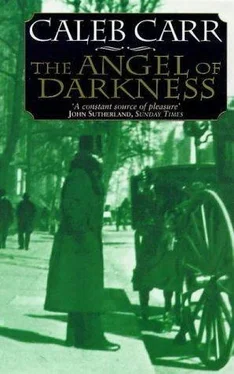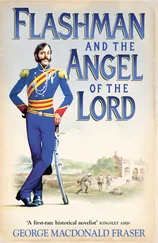Caleb Carr - The Angel Of Darkness
Здесь есть возможность читать онлайн «Caleb Carr - The Angel Of Darkness» весь текст электронной книги совершенно бесплатно (целиком полную версию без сокращений). В некоторых случаях можно слушать аудио, скачать через торрент в формате fb2 и присутствует краткое содержание. Жанр: Детектив, на английском языке. Описание произведения, (предисловие) а так же отзывы посетителей доступны на портале библиотеки ЛибКат.
- Название:The Angel Of Darkness
- Автор:
- Жанр:
- Год:неизвестен
- ISBN:нет данных
- Рейтинг книги:5 / 5. Голосов: 1
-
Избранное:Добавить в избранное
- Отзывы:
-
Ваша оценка:
- 100
- 1
- 2
- 3
- 4
- 5
The Angel Of Darkness: краткое содержание, описание и аннотация
Предлагаем к чтению аннотацию, описание, краткое содержание или предисловие (зависит от того, что написал сам автор книги «The Angel Of Darkness»). Если вы не нашли необходимую информацию о книге — напишите в комментариях, мы постараемся отыскать её.
The Angel Of Darkness — читать онлайн бесплатно полную книгу (весь текст) целиком
Ниже представлен текст книги, разбитый по страницам. Система сохранения места последней прочитанной страницы, позволяет с удобством читать онлайн бесплатно книгу «The Angel Of Darkness», без необходимости каждый раз заново искать на чём Вы остановились. Поставьте закладку, и сможете в любой момент перейти на страницу, на которой закончили чтение.
Интервал:
Закладка:
As for Libby Hatch, she erupted with a short, loud sound that I could’ve sworn was a laugh; but when I looked over, she had her face buried in her hands, and seemed to be crying.
Judge Brown went to work restoring order, though he did so more gently than usual. As the crowd started to quiet down, he looked around the room with a somber face.
“The court is indeed sorry to receive this news,” he said. “Reverend Parker was well known and respected in this community, despite any allegations that have been made in this room. Under the circumstances, I would suggest that we call a recess until two o’clock-at which hour, Mr. Picton, you can call your next witness. Or, if you need more time-”
Still looking very shaken, Mr. Picton began to shake his head. “No, Your Honor. Thank you. The state will be ready at two o’clock. With its next witness…”
The judge banged away, and as soon as he’d left the courtroom the place came alive again. Mr. Picton collapsed back into his chair, and none of us made any move toward him, not really knowing what we could possibly say. Once again, things were not going the way he’d planned, and the future of our case looked like it was in doubt-especially in light of the way Mr. Darrow had handled Louisa Wright, a witness whose testimony wouldn’t ever receive corroboration now. Knowing all this, Mr. Picton just sat there in his chair for what seemed a long time, staring at the telegram in his hand; finally, he lifted his face and looked over to the rest of us-and to one of us in particular.
“Well, Doctor,” he said, very quietly. “I hope you can be ready by two, because I can’t let the jury sleep on what they’ve heard today.” He paused, raising an eyebrow. “You’re all we’ve got left.”
The Doctor nodded, realizing, it seemed, just what a tight spot he was now in. But his voice when he spoke was very controlled-calm, even. “That’s all right, Mr. Picton,” he said, touching the hair under his lower lip. “I may have learned a thing or two from our friend Darrow…”
CHAPTER 47
Coming back into the courtroom that afternoon, I took note of a change in the positioning of the guards in the place, one what didn’t make much of an impression on me at the time. The big man who’d usually stood behind Iphegeneia Blaylock was now at the door, while Henry, our old friend with the narrow head and the slow brain, was standing inside the oak railing, near the defense table. Writing the switch off to each man wanting a change of pace, I didn’t, like I say, think much of it; but now, looking back, I can see that it was the first indication of something much more sinister, something that would eventually result in an unexpected and terrible conclusion to the trial. It would’ve saved a lot of heartache if I could’ve seen what the shift really signaled, if any of our group could have; but the only one who might’ve logically been expected to read it correctly was the Doctor, and he was much too focused on his coming showdown with Mr. Darrow to pay attention to those kind of seemingly small details.
Taking the stand at just past two, the Doctor spent most of the next hour answering Mr. Picton’s questions about the work he’d done with Clara Hatch, proceeding from there into a discussion of his assessment of Libby Hatch’s mental condition. The jury, like the people in the galleries around them, were pretty obviously disposed to view the Doctor’s statements with what you might call skepticism, when he first began to speak; but as was so often the case when he appeared in court, he slowly began to win at least some of them over with his clear and compassionate statements, especially when it came to the subject of Clara. Making it clear that while treating the girl he’d simply followed his standard procedure for dealing with such cases-and also making it clear just how many similar cases he had dealt with-the Doctor painted a picture of a very bright, very sensitive girl, one whose mind had been terribly jumbled but not broken by the events what’d occurred on the night of May 31st, 1894. His description of Clara had the effect of softening the jury up to the point where they became interested in the details of his medical diagnosis, instead of being put off by them; and as he talked about spending long days sitting and drawing with her, making it clear that he’d neither tried to force her to speak nor put words in her mouth once she did begin to communicate, those twelve men became more and more what you might call receptive, so that by the time Mr. Picton began to inquire about Libby Hatch, they were ready to hear whatever the Doctor had to say. There was no clever maneuvering involved in all this: the simple fact was that for all the Doctor’s unusual appearance, his accent, and the strange nature of much of his work, when he talked about children his attitude was so honest and caring that even the most skeptical types couldn’t question that he honestly cared about what was best for his young charges.
Mr. Picton’s queries about Libby Hatch were all designed for one basic purpose: to show that the woman was calculating, not insane, and that she was very capable of using a variety of methods to get what she wanted. The Doctor told about the three different approaches she’d employed to try to gain his sympathy-playing the victim, the seductress, and finally the wrathful punisher-and he explained how none of them was what he called “pathological” by nature. They were, in fact, methods what were very commonly used by many different sorts of women when they were trying to get the upper hand in a given situation-especially a situation what involved men. Playing Devil’s advocate for a moment, Mr. Picton asked if a woman’s murdering her own kids could really be included as part of such efforts-if it could actually be looked at as her trying to gain greater control over her life and her world. Here the Doctor launched into a long recital of similar cases he’d seen and read about over the years, cases where women had indeed done away with their offspring when said kids stood in the way of what their mothers perceived as their own basic needs.
Part of this conversation was a long examination of a case we’d all come to know well: the life and killings of Lydia Sherman, “Queen Poisoner.” The Doctor noted some very interesting similarities between that murderess and Libby Hatch: Lydia Sherman had been what the Doctor referred to as “temperamentally as well as constitutionally unsuited to either marriage or motherhood,” but that hadn’t stopped her from going hunting for husbands and bearing children over and over. Whenever things’d gotten intolerable-as they were always bound to do, given her personality-she just killed each family off, instead of accepting that the problem might lie inside herself. The same sort of “dynamic,” the Doctor said, controlled Libby Hatch’s behavior: for whatever reason (and he made sure to mention the fact that Libby never would discuss her childhood with him) the defendant just couldn’t tolerate the gap between what she wanted and what she thought society expected of a woman. Headstrong and absorbed with her own needs and desires as she was, Libby couldn’t let even children stand in the way of her plans; but she also felt a desperate need to have people perceive her as a good woman, a caring mother, a loving wife. Looked at from this angle, the strange story about the phantom Negro on the Charlton road really wasn’t so odd: only a tale so fantastic could make her look like a hero to the people in her town, instead of a woman who’d murdered three kids what were in her way. But there was nothing, the Doctor emphasized, insane in any of this: members of the male sex very often went to the gallows for similar crimes, without anybody ever suggesting that they were crazy.
Читать дальшеИнтервал:
Закладка:
Похожие книги на «The Angel Of Darkness»
Представляем Вашему вниманию похожие книги на «The Angel Of Darkness» списком для выбора. Мы отобрали схожую по названию и смыслу литературу в надежде предоставить читателям больше вариантов отыскать новые, интересные, ещё непрочитанные произведения.
Обсуждение, отзывы о книге «The Angel Of Darkness» и просто собственные мнения читателей. Оставьте ваши комментарии, напишите, что Вы думаете о произведении, его смысле или главных героях. Укажите что конкретно понравилось, а что нет, и почему Вы так считаете.











